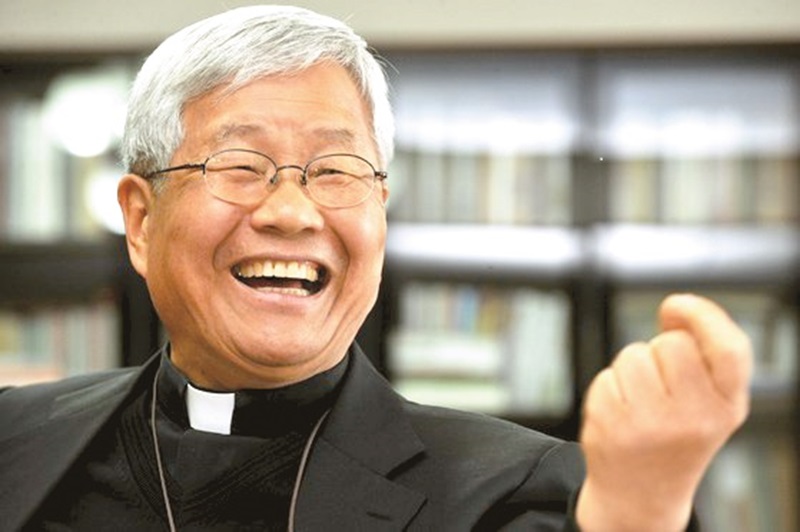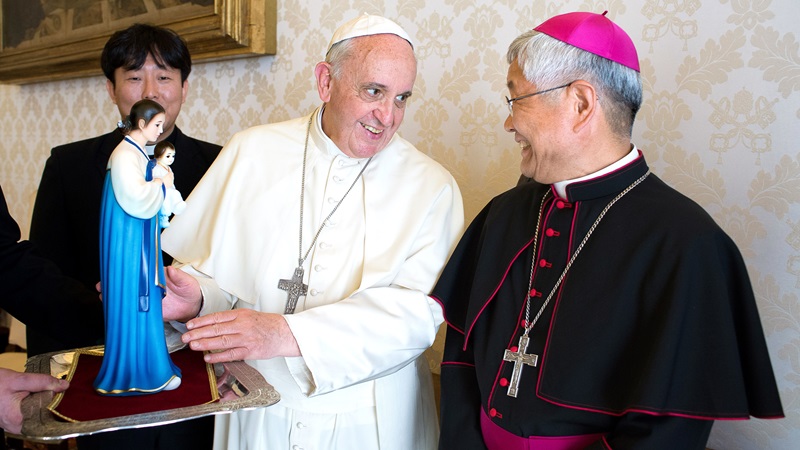The Pope, often seen as a moral and spiritual leader, also wields influence as a significant “international political actor.” Stalin famously mocked the Pope, asking, “How many divisions does the Pope have?” Yet history tells a different story: the collapse of the Soviet Union was partly due to the collaboration between Pope Saint John Paul II and U.S. President Ronald Reagan.
Now, speculation is emerging about the next leader of the Catholic Church. With Pope Francis’s health under scrutiny and a precedent set by the resignation of his predecessor, discussions about the next conclave have gained traction. The New Yorker, in its November 10 article titled “Pope Francis, Cardinals, and the Conclave”, analyzed how the process of selecting the next Pope may differ from the past. Similarly, the UK-based Economist, a self-proclaimed global authority in journalism, recently mentioned South Korea’s Cardinal Lazarus You Heung-sik as a potential candidate.

The Catholic Church in South Korea has quietly grown, now boasting 6 million adherents. Unlike many other regions, these faithful often seek the Church out on their own rather than being actively proselytized. Among Christian denominations in Korea, Catholicism is second only to the 6.5 million members of the Presbyterian Church. In the U.S., the Catholic Church is the largest Christian denomination, with a membership nearing 70 million, far outpacing the Southern Baptist Convention’s 20 million.
The Economist, founded in 1843, is more than a magazine—it identifies as a newspaper, rivaling influential outlets like the Financial Times, New York Times, and The Guardian. Its analyses and opinions often shape global discourse, and even Karl Marx cited it in his writings. Today, the publication describes itself as a “global institution” providing analysis and commentary for the world’s elite on international politics and economics.
Despite criticisms for being “opinionated,” The Economist remains steadfast in its advocacy for free-market economies and democracy, scrutinizing both the left and right when they impede “democratic capitalism.” In 2013, ahead of the conclave that elected Pope Francis, the publication noted the Church’s lingering Eurocentrism, arguing for a non-European Pope—a prediction that proved accurate with the election of Pope Francis, the first non-European Pope in over 1,200 years.
On December 7, The Economist published an article titled “Could the Next Pope Come From Africa or Asia?”. The piece highlights the rapid growth of Catholicism in these regions and, intriguingly, mentioned Cardinal You Heung-sik, the Prefect of the Vatican’s Dicastery for the Clergy, as a potential candidate. Known for his warm demeanor and resolute commitment to the Church, Cardinal You’s name is gaining traction in discussions about the future of Catholic leadership.

A Korean Pope? Why It’s Plausible
The idea of a Korean Pope may seem aspirational, but there are compelling reasons why it could become a reality:
1. Exemplary Growth of the Korean Catholic Church
South Korea’s Catholic Church stands out among its global counterparts, having produced 103 canonized saints. In terms of saintly figures by nationality, Korea ranks sixth after Italy, France, Spain, Germany, and Vietnam. The Church’s martyrs, who chose death over renouncing their faith during persecution, exemplify its spiritual resilience. A Pope from Korea could invigorate global Christianity and help the Church recover from recent scandals.
2. Harmony Between Progressives and Conservatives
Unlike regions where internal divisions run deep, Korea’s Catholic Church has maintained relative harmony between progressive and conservative factions. Its ability to coexist could serve as a model for the global Church, which often struggles with ideological conflicts.
3. Inspiration for Developing Nations
Korea’s Catholic Church has grown alongside the nation’s remarkable economic and political transformation. Its experience offers hope and strategies for churches in countries still grappling with poverty and authoritarianism—issues that are close to Pope Francis’s heart.
4. Interfaith Cooperation
The Korean Catholic Church enjoys strong relationships with Protestant and Buddhist communities, setting an example of interfaith respect and collaboration. This spirit aligns with the vision of the Second Vatican Council, which emphasizes recognizing the good in other religions.
In both politics and religion, symbols matter. Achieving “firsts” often reshapes the direction of power. While the United States has seen its first Black president, a female president remains a milestone yet to be achieved. Similarly, in the Catholic Church, we may one day see a Black, Asian, or Middle Eastern Pope—and perhaps, even a female Pope in the distant future.
The selection of a Korean Pope would mark a significant step forward, not just for the Church but for global leadership. As Cardinal You’s quiet but compelling presence continues to garner attention, his potential candidacy offers a glimpse into a future where “K-Catholicism” and “K-leadership” leave a lasting impact on the world.
BY Whanyung Kim [kim.whanyung@joongang.co.kr]




